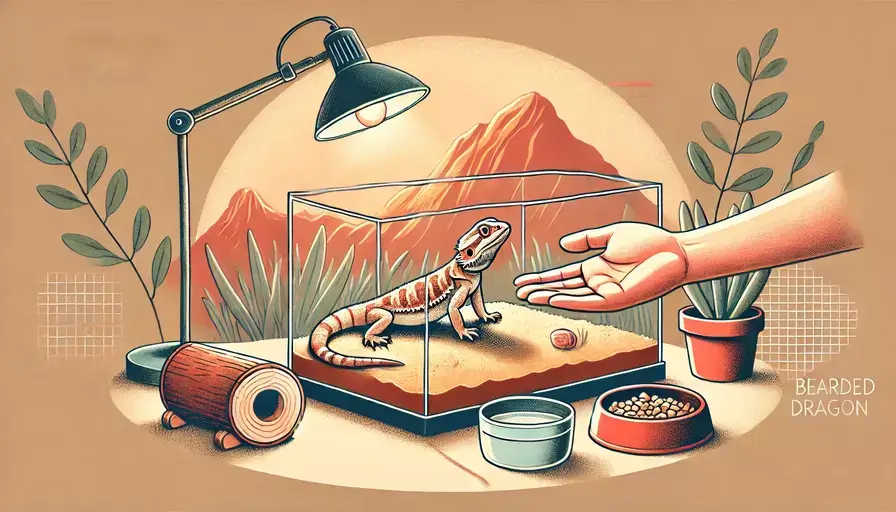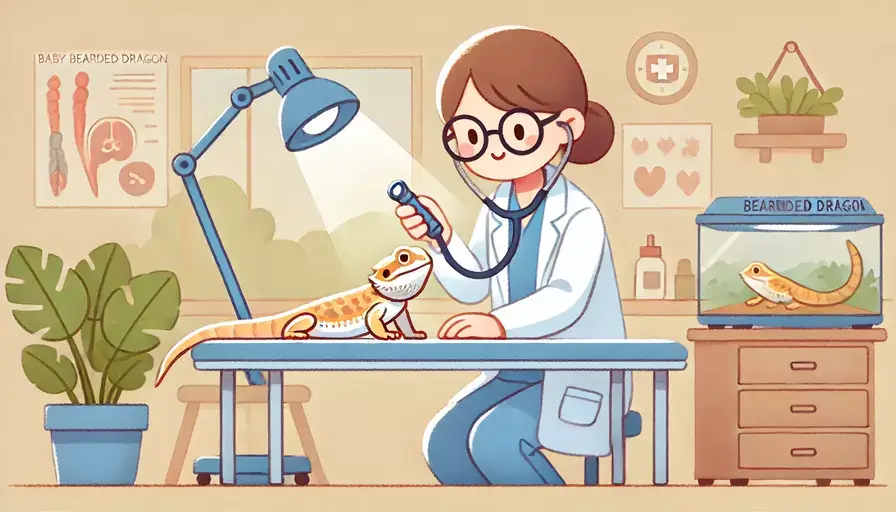Bringing a newborn bearded dragon into your family is both thrilling and daunting. This guide is designed to help you navigate the initial stages of caring for your new pet, ensuring they grow into a healthy and happy adult. So let’s dive in on how to care for newborn bearded dragons.
Essential Care for Newborn Bearded Dragons
How to Care for Newborn Bearded Dragons?
Habitat: Set up a 20-gallon tank with a basking area and a cooler area. Ensure the habitat has proper UVB lighting and maintain a temperature gradient.
Diet: Feed them small, soft-bodied insects like pinhead crickets and finely chopped greens. Dust their food with a calcium supplement to aid in proper bone development.
Is it OK to Hold a Baby Bearded Dragon?
Are Baby Bearded Dragons Friendly?
What to Do When You First Get a Baby Bearded Dragon?
When you first bring your baby bearded dragon home, it’s essential to give them time to acclimate:
- Settle In: Place them in their new habitat and let them explore without interference for the first few days.
- Monitor Health: Keep an eye on their eating, basking, and defecation patterns to ensure they are adjusting well.
- Gradual Interaction: Begin with brief handling sessions to build trust and gradually increase as they become more comfortable.

Nutrition and Feeding Schedule
Proper nutrition is critical for the growth and health of newborn bearded dragons:
- Feeding Frequency: Offer food three times a day, allowing them to eat as much as they can in 10-15 minute intervals.
- Balanced Diet: A mix of appropriate insects and vegetables is crucial. Ensure insects are small enough to prevent choking or digestive issues.
Socialization and Habituation
Socializing your bearded dragon from a young age is vital for their development:
- Handling: Start with short handling sessions and increase the duration as your dragon becomes more comfortable.
- Environment: Introduce them to different stimuli within and outside their cage to encourage adaptability and reduce stress.
Health Care and Monitoring
Regular health checks are essential:
- Veterinary Visits: Schedule check-ups with a reptile-savvy vet to catch any issues early.
- Watch for Signs of Distress: Be vigilant about any changes in behavior or appetite as these can be early signs of health issues.

Things to Avoid When Caring for a Newborn Bearded Dragon
Caring for a newborn bearded dragon requires not only doing the right things but also avoiding certain practices that can harm their development or health. Here’s a list of common pitfalls to avoid:
Avoid Overhandling
While it’s beneficial to handle your bearded dragon to promote socialization, too much handling can stress them out. Newborns are particularly delicate, so keep handling sessions short and infrequent initially.
Avoid Improper Substrates
Using the wrong substrate can lead to impaction and other health issues. Avoid loose substrates like sand or gravel, which can be ingested. Instead, opt for reptile carpet or paper towels until they are older.
Avoid Inadequate Heating and Lighting
Proper temperature and UVB light are crucial for the health of your bearded dragon. Inadequate heating can prevent them from digesting their food properly, while insufficient UVB light can lead to metabolic bone disease. Always ensure that your heating and lighting setup is appropriate for their age and size.
Avoid Feeding Inappropriate Foods
Newborn bearded dragons have specific dietary needs. Avoid feeding them insects that are too large or hard-shelled, which can cause choking or digestive issues. Also, steer clear of lettuce and other low-nutrient vegetables as they provide little nutritional value.
Avoid Neglecting Hygiene
Regular cleaning of the cage and its contents is crucial to prevent the build-up of bacteria and parasites. Neglecting the hygiene of your bearded dragon’s environment can lead to infections and other health complications.
Avoid Rapid Environmental Changes
Newborn bearded dragons can be sensitive to rapid changes in their environment. Avoid sudden changes in temperature, humidity, or their setup, which can stress them and lead to illness.
Avoid Excessive Moisture
While some humidity is necessary, too much moisture in the habitat can lead to fungal and respiratory problems. Ensure that your habitat has adequate ventilation to prevent excessive humidity.
Linking to Further Resources
Gain deeper insights into creating a suitable living environment for bearded dragons by reading our detailed article on Creating the Perfect Bearded Dragon Habitat.
Conclusion
Caring for a newborn bearded dragon involves attention to detail and a commitment to providing a nurturing environment. With the right knowledge and tools, you can ensure your bearded dragon’s health and happiness. Remember, the key to success with these fascinating pets lies in consistent care and patience.
Remember to also check out our detailed guide on Bearded Dragon Tanks: The Essential Guide for Optimal Housing for more information on setting up the perfect home for your pet, incorporating best practices and avoiding common pitfalls for a thriving habitat.

